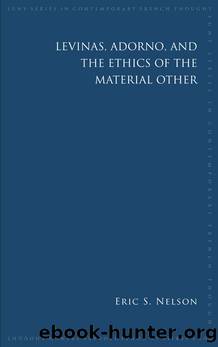Levinas, Adorno, and the Ethics of the Material Other by Eric S. Nelson;

Author:Eric S. Nelson;
Language: eng
Format: epub
Publisher: State University of New York Press
Published: 2020-04-14T16:00:00+00:00
A Dusselian Interpretation of Bloch and Levinas
This chapter has traced in outline the works of thinkers who have disclosed the bonds between dignity and temporalizing material life, delineating how the works of Bloch and Levinas offer two strategies for relating the ethical-political demands for dignity and rights with the temporal sensuous embodiment of existence.
In God, Death, and Time, Levinas reflects on dignity in the context of human temporality and mortality. Bloch provides a more adequate way of conceiving this nexus than Heidegger, whoâLevinas contendedâprioritizes oneâs own death and oneâs mastery over it rather than the death of the other and the dignity of the other in material moments of suffering and death.44
Levinasâs reading of Bloch can be situated in the larger circumstances of their thought as argued in this chapter. Bloch and Levinas unfold the social-politically oriented implications of the interruptive and reorienting temporality of the prophetic. Bloch undertakes this in terms of the anticipation of that which exceeds and disturbs the present, a historically immanent and revolutionary concrete utopia of hopeâhinted at in dreams, imaginings, stories, and religious visionsâin the realization of the flourishing of temporal, sensuous, material subjects with ethical poise and dignity.45 Levinas proceeds in contrast through an infinite (which is not merely the negation of the finite) asymmetrical (in contrast to hierarchically superior) responsibility to the otherâs vulnerable sensible existence and suffering.
Finite temporal material life is thought by neonatural law theorists to entail the elimination of human dignity through the reduction of validity to facticity, and universal natural law to positive historical laws. But is this the case? Can natural law be ânaturalizedâ in the sense of being linked to material sensuous existence?
Levinasâs reading of Bloch concludes that loveâthe receiving of the otherâis as âstrong as deathâ and the anxiety of âmy own death.â46 Bloch expresses not only the love of the other in response to the otherâs mortality and vulnerability, instead of the Heideggerian âmy own,â but also solidarity to others in their material life. Blochâs unrestricted solidarity offers a correction to Levinas. Levinasâs Bloch offers an alternative interpretation of time based on the other rather than the self, which my argument in this chapter has extended from Heideggerâs Dasein to the soul of the natural law tradition. The nothingness in the utopian confrontation with the present is not the nothingness of death, as Levinas noted, but it is also not the nothingness of a nontemporal eternity. Levinasâs reading of Bloch reveals how temporal material configurations of labor and hope reveal dignity and glory in a time that is defined neither by death (Heidegger) nor deathlessness (as in natural law).
If the arguments of Bloch and Levinas are correct, the materiality of concrete sensuous life does not entail the elimination of dignity. The early Marx could contest the commodification of existence and labor by presupposing the distinction between price and dignity that capitalist economic processes dismantle. Dignity is not solely a concern of Marxâs early works. In Towards an Unknown Marx, Dussel analyzes how the exteriority
Download
This site does not store any files on its server. We only index and link to content provided by other sites. Please contact the content providers to delete copyright contents if any and email us, we'll remove relevant links or contents immediately.
The remains of the day by Kazuo Ishiguro(8401)
Tools of Titans by Timothy Ferriss(7821)
Giovanni's Room by James Baldwin(6814)
The Black Swan by Nassim Nicholas Taleb(6773)
Inner Engineering: A Yogi's Guide to Joy by Sadhguru(6445)
The Way of Zen by Alan W. Watts(6290)
Asking the Right Questions: A Guide to Critical Thinking by M. Neil Browne & Stuart M. Keeley(5358)
The Power of Now: A Guide to Spiritual Enlightenment by Eckhart Tolle(5341)
The Six Wives Of Henry VIII (WOMEN IN HISTORY) by Fraser Antonia(5240)
Astrophysics for People in a Hurry by Neil DeGrasse Tyson(5003)
12 Rules for Life by Jordan B. Peterson(4165)
Housekeeping by Marilynne Robinson(4070)
The Ethical Slut by Janet W. Hardy(4041)
Skin in the Game by Nassim Nicholas Taleb(3973)
Double Down (Diary of a Wimpy Kid Book 11) by Jeff Kinney(3932)
Ikigai by Héctor García & Francesc Miralles(3900)
The Art of Happiness by The Dalai Lama(3850)
Skin in the Game: Hidden Asymmetries in Daily Life by Nassim Nicholas Taleb(3730)
Walking by Henry David Thoreau(3685)
